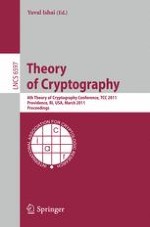2011 | OriginalPaper | Buchkapitel
Exploring the Limits of Common Coins Using Frontier Analysis of Protocols
verfasst von : Hemanta K. Maji, Pichayoot Ouppaphan, Manoj Prabhakaran, Mike Rosulek
Erschienen in: Theory of Cryptography
Verlag: Springer Berlin Heidelberg
Aktivieren Sie unsere intelligente Suche, um passende Fachinhalte oder Patente zu finden.
Wählen Sie Textabschnitte aus um mit Künstlicher Intelligenz passenden Patente zu finden. powered by
Markieren Sie Textabschnitte, um KI-gestützt weitere passende Inhalte zu finden. powered by
In 2-party secure computation, access to common, trusted randomness is a fundamental primitive. It is widely employed in the setting of computationally bounded players (under various complexity assumptions) to great advantage. In this work we seek to understand the power of trusted randomness, primarily in the computationally unbounded (or information theoretic) setting. We show that a source of common randomness does not add any additional power for secure evaluation of deterministic functions, even when one of the parties has arbitrary influence over the distribution of the common randomness. Further, common randomness helps only in a trivial sense for realizing randomized functions too (namely, it only allows for sampling from publicly fixed distributions), if UC security is required.
To obtain these impossibility results, we employ a recently developed protocol analysis technique, which we call the
frontier analysis
. This involves analyzing carefully defined “frontiers” in a weighted tree induced by the protocol’s execution (or executions, with various inputs), and establishing various properties regarding one or more such frontiers. We demonstrate the versatility of this technique by employing carefully chosen frontiers to derive the different results. To analyze randomized functionalities we introduce a frontier argument that involves a geometric analysis of the space of probability distributions.
Finally, we relate our results to computational intractability questions. We give an equivalent formulation of the “cryptomania assumption” (that there is a semi-honest or standalone secure oblivious transfer protocol) in terms of UC-secure reduction among randomized functionalities. Also, we provide an
unconditional result
on the uselessness of common randomness, even in the computationally bounded setting.
Our results make significant progress towards understanding the exact power of shared randomness in cryptography. To the best of our knowledge, our results are the first to comprehensively characterize the power of large classes of randomized functionalities.
